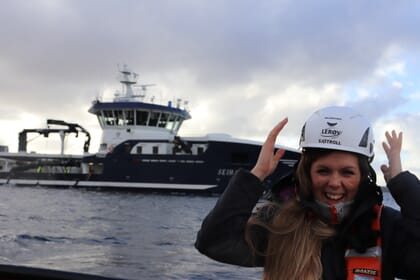
Nor did the prospect of watching dolphin massacres, the Great Pacific Garbage Patch and Don Stanford talking about chlamydia, while peering into a skip filled with dead salmon, fill me with joy.
Given that fisheries and aquaculture each provide roughly 50 percent of the world’s fish and seafood, I expected that a fair chunk of this 90-minute, film - made by the same team that created the Leonardo di Caprio-funded Cowspiracy back in 2014 - would be devoted to aquaculture. But no, to my initial relief, aquaculture merited less than 15 minutes of screentime. The usual accusations – relating to mangrove destruction, sea lice, organic pollution and forced labour on fishing vessels – were trotted out and levelled at the salmon and shrimp farming sectors and the rest of the industry was politely ignored before the documentary moved back to beating down fishermen.
Not long after the film ended, however, my relief turned to disappointment, in part because many of the accusations of malpractice levelled at the aquaculture industry had dramatically improved in recent years. In particular those relating to forced labour, thanks to the efforts of groups such as the Seafood Task Force, which has had a huge impact in ensuring that shrimp producers do not source their feeds from the “ghost ships” associated with human rights abuses in Southeast Asia – an initiative that appears to have passed George Monbiot by.
But, as time went on, what really began to get my goat was the lack of voice given to either the aquaculture sector, or people from organisations that might be remotely supportive of it. Even a Faroese man was given the chance to justify hacking beached cetaceans to death with some form of Nordic machete. The latter-day Viking's argument that a whale’s life is no more precious than a chicken’s is debatable – given the relative intelligence and abundance of the two animals. But filmmaker Ali Tabrizi at least joined him for a coffee, and allowed him to make his point and present a human face to the archipelago’s cottage whaling industry – in a rare moment of objectivity.
No such luck for fish farmers. Tabrizi claims he was refused an interview by Mowi Scotland, although his attempts to secure one have since been outed as half-hearted and underhand. Instead of an interview with a genial farmer at a typical farm, viewers were treated to footage of an isolated, horrifically lice-torn salmon taken by campaigners. And then to Don Staniford, an anti-salmon farming activist, rummaging around in a bin full of dead fish while reciting a list of diseases and inflated salmon mortality statistics.
Aquaculture is yet to find a DiCaprio to champion it. And I don’t expect that it ever will. But hopefully someone in Hollywood will one day realise that turning vegan and renouncing seafood isn’t a wildly palatable choice to the millions that either rely on seafood (be it farmed or wild) to make a living or to stay alive.
In the meantime, perhaps someone can step up and make a slightly more thoughtful, rather than thought-provoking, documentary on the subject – yet one that still has mainstream appeal?




